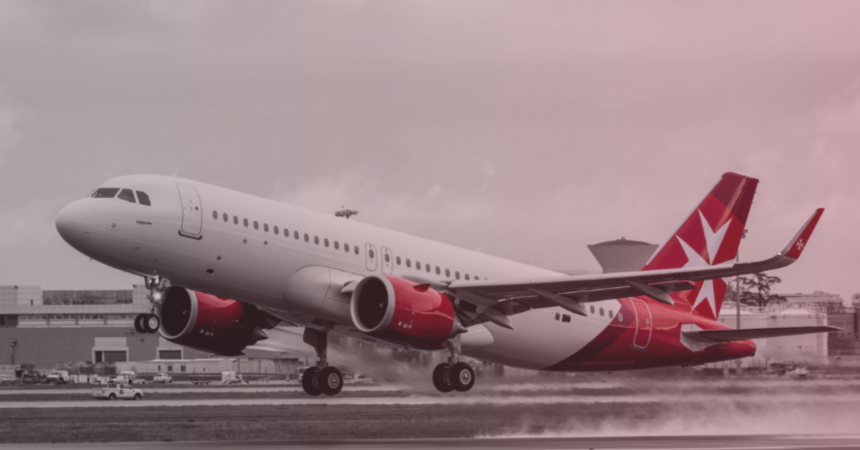KM Malta Airlines, the new national airline which replaced Air Malta last week, employed pilots and cabin crew who formerly worked at the bankrupt airline on condition that they signed legal waivers prohibiting them from seeking legal action to claim their rights.
The waivers were signed alongside new employment contracts with KM Malta, introducing different working conditions to those at Air Malta. The move has been shrouded in a wall of silence from all concerned, as questions have been raised about the new airline’s operations.
As part of the government’s ‘seamless’ transition between Air Malta and KM Malta, pilots and cabin crew who worked with the now-shuttered airline could apply for work at the new airline under different conditions, as contracts would not be automatically transferred.
Multiple sources who spoke to The Shift on condition of anonymity said that Air Malta pilots and cabin crew also signed additional agreements with KM Malta upon signing the new contracts.
These agreements would require them to renounce existing legal cases, accept settlement offers, and sign legal waivers, preventing them from suing the former and new airlines.
Last month, The Shift reported that court documents revealed a number of pilots had withdrawn from a legal case against Prime Minister Robert Abela, indicating out-of-court settlements had been reached.
The case, brought by the pilots’ union ALPA in 2020, cited a secret government agreement from 2018 that guaranteed pilots’ jobs under favourable terms at the time.
The secret side agreement was drafted and negotiated by Robert Abela while he was a practising lawyer and consultant to Air Malta. It was signed by disgraced former minister Konrad Mizzi.
Unlike early retirement schemes, which form part of the collective agreements signed with Air Malta, the side agreement was signed with the government.
This means Mizzi and Abela’s agreement continues to apply, binding the government to honour it even after Air Malta’s closure.
The sources who spoke to The Shift confirmed that pilots and cabin crew signed legal waivers alongside their employment contracts at the new airline.
While pilots and cabin crews working conditions with Air Malta were governed by collective agreements negotiated by their respective unions, KM Malta pilots and cabin crew were engaged individually.
Unlike Air Malta, KM Malta has not yet recognised the Airline Pilots’ Association (ALPA) and the Union of Cabin Crew (UCC) as its workers’ unions.
It is unknown how much money the government has forked out so far to appease the new employees and buy their silence, although this is expected to cost taxpayers tens of millions.
A less-than-‘seamless’ transition
The government’s pledge that the transition between Air Malta and KM Malta would be “seamless” was far from fulfilled.
It was forced to create a new airline following the European Commission’s refusal to allow €290 million in state aid for the bankrupt Air Malta.
The European Commission insisted on the need for “economic discontinuity” between the two airlines. The transition could not be a simple transfer of business, although developments at the new airline indicate this to be the case.
KM Malta Airlines is almost identical to Air Malta. It has the same chairman, David Curmi, the same planes, the same staff, the same caterer, and even a very similar livery.
KM Malta has also retained expensive Abu Dhabi-based consultants despite the latter failing to save the airline from dissolution.
In further muddying of the transition, The Shift reported how Air Malta trained and promoted pilots ahead of their transfer to the new airline.
At the tail end of Air Malta’s operations last month, the General Worker’s Union issued a directive for Air Malta employees represented by the union not to carry out work related to KM Malta. This included work concerning contracts, meetings, training and basic airline operations, suggesting Air Malta employees were being used for KM Malta’s needs.
All involved parties have kept details on the transition and the new airline’s operations strictly confidential. KM Malta, Air Malta, Prime Minister Robert Abela, Finance Minister Clyde Caruana, ALPA, and the GWU have all refused to answer questions.
It is as yet unclear whether the government-appointed chairman, David Curmi, has retained his €21,500 a month financial package, which The Shift revealed he received at Air Malta.
This investigation was supported by OCCRP and The Daphne Caruana Galizia Foundation.













Lots of secrets, unknown and under-wraps. Does anybody know what’s NEW with KM?
Different contracts and a total break with their previous employer for staff. This is good, Curmi and the Dubai consultants not so much.
Some pilots with high seniority and relatively young ( <55 ) have signed ERS agreements of around 1Million Euros ( Tax Free ) payouts.
And the younger ones for around 450k. Not too bad hux.
That’s the price paid for dismantling ALPA!